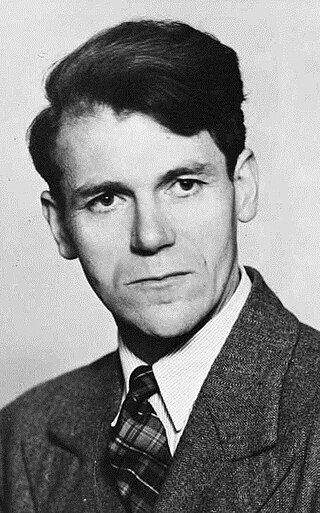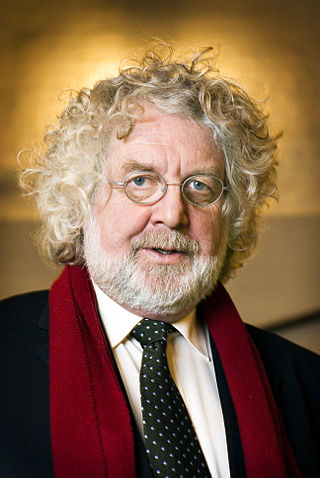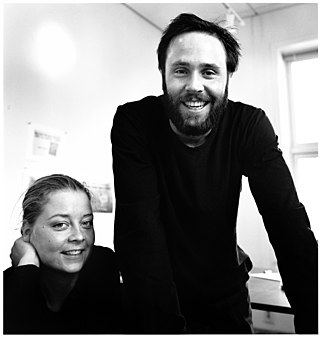Related Research Articles

Jon Olav Fosse is a Norwegian author, translator, and playwright. In 2023, he was awarded the Nobel Prize in Literature "for his innovative plays and prose which give voice to the unsayable."

The Norwegian language conflict is an ongoing controversy in Norwegian culture and politics about the different varieties of written Norwegian. From 1536/1537 until 1814, Danish was the standard written language of Norway due to the union of crowns with Denmark. As a result, the proximity of modern written Norwegian to Danish underpins controversies in anti-imperialistic nationalism, rural versus urban cultures, literary history, diglossia, spelling reform, and orthography.
Britt Karin Larsen is a Norwegian poet, author and government scholar. Larsen debuted as a poet in 1978 with 5 mg blues og andre dikt, and has published many poetry collections and novels since. She is best known for her novel trilogy about Norwegian and Swedish Travellers, De som ser etter tegn (1997), De usynliges by (1998) and Sangen om løpende hester (1999). The trilogy has been called a literary monument for Romany people in Norway. Larsen was given the Norsk PEN's highest freedom prize, the Ossietzky-prisen, in 2000.

Olav Håkonson Hauge was a Norwegian horticulturist, translator and poet.

Edvard Hoem is a Norwegian novelist, dramatist, lyricist, psalmist and government scholar. He made his literary debut in 1969, with the poetry collection Som grønne musikantar. He was awarded the Norwegian Critics Prize for Literature in 1974 for the novel Kjærleikens ferjereiser. He was awarded the Melsom Prize in 2006, and the Peter Dass Prize in 2007 for the novel Mors og fars historie. He received the Ibsen Prize in 2008 for the play Mikal Hetles siste ord.
Night Song(s) or Nightsong(s) may refer to:
Curling Legs Productions A/S is a Norwegian record label with a catalogue encompassing all styles of jazz and improvised music. It was started by Knut Værnes and Morten Halle to release their own music. In 1994, Odin Records was licensed to Curling Legs from the Norwegian Jazz Forum, to continue the production of Norwegian jazz. In addition to Værnes and Halle, the third co-owner of Curling Legs is Helge Westbye, the director of the record label Grappa Music, and the label is part of FONO. The music is distributed through the company Musikkoperatørene.
Sondre Bratland is a Norwegian folk singer, song teacher and Government scholar. He has performed traditional songs from Setesdal and Telemark, collected religious folk tunes and composed music to songs by poets as Olav H. Hauge and Tarjei Vesaas. His album Pilegrimens Sangbog from 1982 earned him Spellemannprisen.

Anne Gravingen and Bendik Romstad are a married couple who are both former advertising agents, now food entrepreneurs, who have worked together continuously since they studied together at Westerdals School of Communication in 1994. They were named by Aftenposten in 2005 as Norway's most creative couple.

The 2013 Valdresekspressen hijacking was a hijacking of an express bus running on the Nor-Way Bussekspress Valdresekspressen route, which took place east of Øvre Årdal on 4 November 2013. The driver and both passengers were killed.

Through the Night is a 2011 novel by the Norwegian writer Stig Sæterbakken. It tells the story of a father who goes through the mourning process after his 18-year-old son commits suicide. It was Sæterbakken's last book.

Morning and Evening is a 2000 novella by the Norwegian writer Jon Fosse. It tells the story of a fisherman: the first part of the book is about his birth seen from the perspective of his father, and the second part is about his death, when he revisits important places and moments from his life. The book was published in English in 2015.
I Am the Wind is a 2007 play by the Norwegian writer Jon Fosse. It is about two men, The One and The Other, who travel by boat until The One commits suicide by drowning himself.
The Name is a 1995 play by the Norwegian writer Jon Fosse. It tells the story of a young couple, expecting a child, who move in with the woman's parents, with failures in communication as a consequence. The play premiered on 27 May 1995, directed by Kai Johnsen for Den Nationale Scene in Bergen, during the Bergen International Festival. A production by the German theatre company Schaubühne and the director Thomas Ostermeier was performed at the 2000 Salzburg Festival.

Don't Leave Me is a 2009 novel by the Norwegian writer Stig Sæterbakken. It tells the story of a 17-year-old boy with a dark personality who falls in love with a woman for the first time, but his fear that she will leave him destroys the relationship. The story is told in reverse chronology and written in second person.

Melancholy II, original title Melancholia II, is a 1996 novella by the Norwegian writer Jon Fosse. It is set in Stavanger, in early autumn of 1902, the year of Norwegian artist Lars Hertervig's death, and is told from the perspective of Hertervig's fictitious sister Oline. The novella covers one day, the day that Oline learns that her brother Sivert is dying. Sivert's wife, Signe, tells her in the morning that Sivert wants to speak to her, but Oline is frail, and forgetful, and she only sits down at Sivert's bed later in the day when he has already died. Oline is still mourning Lars, and large parts of the novella describe Oline's memories of Lars. The book is the sequel to Fosse's 1995 novel Melancholy, which is about Hertervig's time as a student.

Sigbjørn Gjelsvik is a Norwegian politician for the Centre Party. He was elected to Parliament in 2017. He also served as minister of local government from 2022 to 2023.

The Støre Cabinet is the incumbent government of the Kingdom of Norway, headed by Labour Party leader Jonas Gahr Støre as Prime Minister. The government was appointed by King Harald V on 14 October 2021, following the parliamentary election on 13 September, consisting of the Labour Party (Ap) and the Centre Party (Sp) as a minority government.
The Alliance – Alternative for Norway is a political party in Norway. It was founded on 22 November 2016 and registered in the Party Register by Hans Jørgen Lysglimt Johansen on 5 January 2017.

The 2023 Nobel Prize in Literature was awarded to the Norwegian playwright and author Jon Fosse for "his innovative plays and prose which give voice to the unsayable". He is the fourth Norwegian recipient of the prize.
References
- 1 2 Rossin, Hans (1997-09-07). "Dukkehjem 1997". Dagbladet (in Norwegian). Retrieved 2015-10-18.
Men formmessig er dette usvikelig Fosse. Han viderefører rendyrkingen av sin språklige minimalisme med stutt verbalitet på overflaten og dybder av følelser og ladede situasjoner under. Som tidligere stykker, er også Natta syng sine songar åpen på den måten at realismen i tekstene kan utlegges som ren heimstaddiktning der karikerte hardinger har hovedrollen. Eller de kan sees som korthogne og snarere antirealistiske allegorier over menneskelige kår i vår tid.
- ↑ Spencer, Charles (2002-03-01). "Beckett without the jokes". The Daily Telegraph . Retrieved 2015-10-18.
- ↑ "Die Nacht singt ihre Lieder". Filmportal.de (in German). Deutsches Filminstitut . Retrieved 2015-10-18.